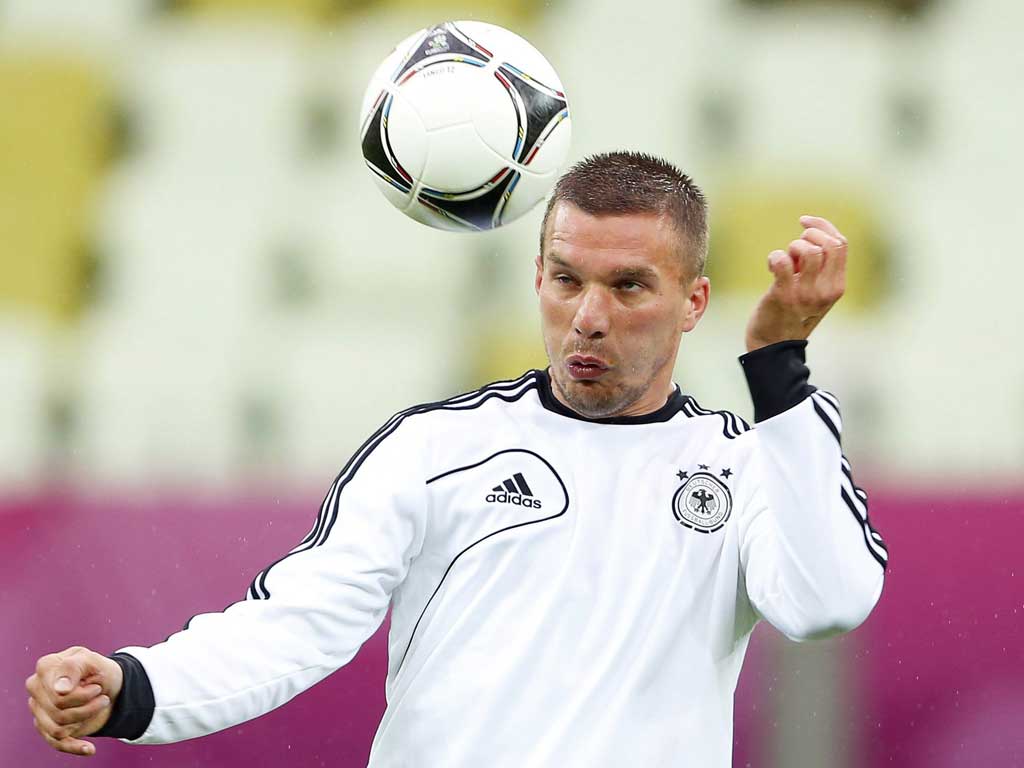Löw proving a master at exploiting weakness
But can the clever coach protect Germany from their own?

And so the Germans await; England's greatest inferiority complex.
There was never much chance that should Roy Hodgson's side beat Italy in Kiev tonight they would have had the comfort of playing the Greeks for a place in the final. There was embarrassment in the German dressing room in Gdansk on Friday night but only when Bastian Schweinsteiger found himself naked in the shower as the Chancellor, Angela Merkel, came in to congratulate them on an emphatic victory over Greece that was relatively free of politics.
The German dressing room was, however, not free of self-analysis. Before boarding the bus with its slogan: "Von Spiel Zu Spiel Zum Grossen Ziel" ("Game by Game to the Great Prize"), Philipp Lahm was unusually downbeat.
"We made it very hard for ourselves," said the team captain. "In the opening 15 minutes we had chance after chance to take the lead and didn't and, when we did, we lost it again. We have to realise the semi-final is going to be very much harder than this."
Amid all the hosannas for Joachim Löw's young squad – Ruud Gullit remarked that they are unquestionably the team of this European Championship – there are weaknesses, especially in defence.
Only in the opening fixture against Portugal have they kept a clean sheet and Löw remarked pointedly that Greece, who had a mere 24 per cent of possession, had one chance and scored twice.
Jérôme Boateng at right back looks vulnerable and while Mats Hummels is in the eyes of Zinedine Zidane the player of this tournament, his partner at centre-half, Holger Badstuber, carries a fragility about his game. Schweinsteiger, the man who gives a young team its hard edge, has been carrying an ankle injury.
These hairline fractures aside, Germany have looked as good as Spain four years ago or Gullit's Dutch team of 1988. In contrast to the intricate Spanish weave of passing known as tiki-taka (originally meant meant as an insult) Germany use the pitch as an Autobahn. Löw is the man with the map.
Germany have had three great managers. Sepp Herberger engineered the Miracle of Berne that saw West Germany somehow overcome Hungary to win the 1954 World Cup. His statement that "the ball is round, the game lasts 90 minutes, everything else is just talk," makes Kenny Dalglish sound like Stephen Fry.
Helmut Schö* led West Germany to a first great plateau between 1972 and 1976 (European Championship, World Cup, European Championship final) while Franz Beckenbauer was a principal figure in the second as Germany reached six major finals between 1980 and 1996. Löw will be the fourth. He is more fun than any of them, who would probably not have allowed Thomas Müller to spend a morning cooking risotto for the press corps.
Schö*, trapped in his hotel room during the 1974 World Cup, suffered something of a breakdown because of the pressure while Beckenbauer was not called "Der Kaiser" for nothing. And there is no journalist who would ever have asked Herberger the two questions Die Welt put to Löw: "Are you gay?" and "Do you wear a toupée?" Löw's replies: "Ask my wife" and "You can give it a tug if you like" may be interchangeable.
Whatever else, Löw is an astonishingly good tactician. He precipitated England's rout in Bloemfontein two years ago by targeting Matthew Upson as the weakest member of Fabio Capello's defence. In the quarter-final against Argentina that followed in Cape Town he did the same to Gabriel Heinze. The Germans again scored four.
In Poland his tactical hunches have paid off glitteringly. Using Lars Bender, who usually plays midfield for Bayer Leverkusen, to fill in for the suspended Boateng at right back was rewarded by the decisive goal against Denmark. Bringing in Marco Reus and André Schürrle for Müller and Lukas Podolski was another targeting of a weakness; in this case the lack of pace in the Greek defence.
It is these kinds of tactical shifts that have captured Arsène Wenger's imagination. "They have grown up astonishingly under Jogi Löw," said the Arsenal manager who is in Poland to commentate for French TV.
When you consider that Löw has hinted he will work abroad after the 2014 World Cup, that he is admired by Wenger, adores working with young footballers and is fluent in English, he seems tailor-made to be Arsenal's next manager.
First, there is a semi-final to win. Germany would prefer it to be against England since they, too, have complexes and one of them is with Italy.
From the 4-3 defeat in the 1970 World Cup semi-final that was hailed as the "game of the century" to the titanic clash in Dortmund in another semi-final 36 years later, the Italians have historically held the whip hand. With England, however, it is another matter.
Join our commenting forum
Join thought-provoking conversations, follow other Independent readers and see their replies
Comments
Bookmark popover
Removed from bookmarks